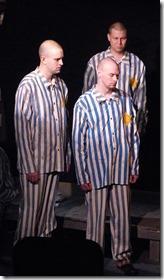
A powerful illustration of the power-and necessity-of comedy
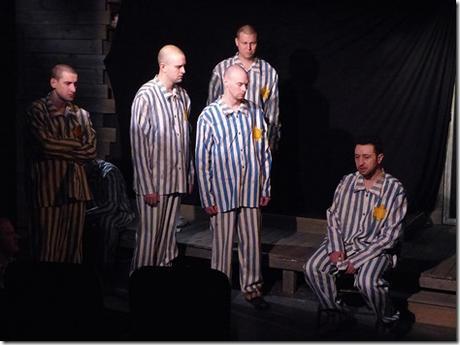
If it hadn't been for (also by Genesis) and Ron Goldman's The Emperor of Atlantis, Jake Rosenberg's fictional account of artistic endeavors in Auschwitz might have seemed a fantasy on par with wishful thinking.
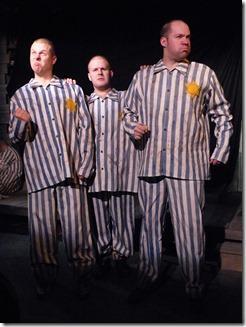
Georg's play is a meta-aware comedy with allusions to its own absurdity with such lines as "What a crazy theatrical coincidence!" and "We have a word for 'ridiculous' [evidence]: PROOF!" His troupe has some misgivings about the concept of playing the show for laughs and making fun of Jews, prompting a discussion on the nature of comedy as a necessary form of disrespecting the oppressor through caricature.
As the director loses control over the artistic path his play will follow, various questions begin to arise about just what exactly Georg does all day when none of them see him working in the camp and where the time to be creative is found. When Dreyfus' fictional interrogation turns into Georg's reality, he must reveal the terrible secret behind the play and the imperative reasons-both pragmatic and philosophical-for its production.
Some of the inspiration for Georg's character may have come from the infamously never-seen " The Day the Clown Cried,: in which a comically inclined man is coerced into using his talents for horror. Georg is not an entirely likable character-he's not above hurling homophobic slurs at poor Hass (Jake Baker), a man who survived immediate execution by claiming a Star of David over a pink triangle. Still, the revelation of his hamartia (fatal flaw) that surrounds his mysterious place in the camp is a believable response to horror and a compelling argument for the need to "ascend the brightest heaven of invention" even in the face of it.
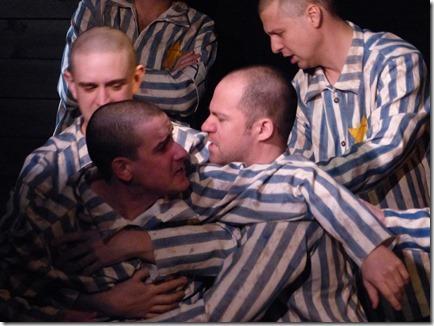
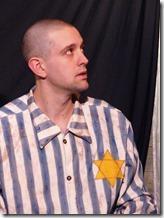
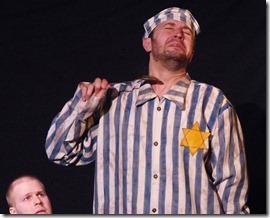
This primarily young cast is dedicated-shaved heads don't lie-but occasionally lists towards the stilted. Some of this comes from the script. Rosenberg is a young playwright with a great deal of promise, though has elements of self-awareness and artifice (an overly belligerent Jorge Bolanos is unnecessary for the dramatic tension) that place it squarely into the 21st century in a way that Cyclist did not. Wicke is a haunting portrait of a man trying to find some last shred of dignity within the context of his own choices, desperately making amends the only way he knows.
Some of the discussion within echoes ongoing debate over whether or not comedy should come anywhere within hailing distance of portrayals of the Holocaust. As Benigni had to clarify when discussing "Life is Beautiful," he clarified that he had not made a comedy about the Holocaust, but rather a work about a comedic character within it. The same could be said of Muse of Fire . To be sure, it's a delicate balancing act, but Georg's impassioned plea reminds us all that comedy is not merely for laughs - it can elevate survival to something approaching hope.
Muse of Fire continues through March 13th at Redtwist Theatre, 1044 W. Bryn Mawr (map), with performances Saturdays 3pm, Tuesdays, Wednesdays and Sundays at 7:30pm. Tickets are $20, and are available by phone (800-838-3006, x1) or online through their website (check for half-price tickets at Goldstar.com ). More information at GenesisTheatricals.com. (Running time: 1 hour 10 minutes, no intermission)
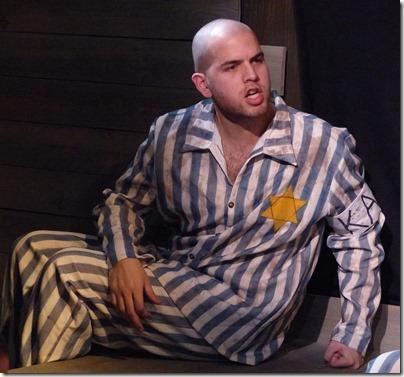
Photos by Ron Goldman
(as Haas, plays Dreyfus), Jorge Bolanos (as Adolph, plays Mauriel), Andrew Canada (as Gonse, plays Le Matin, Brisset), Glenn Garrabrant (as Max, plays Breucker, Picaquart, La Libre Parole), James McGuire (as Emmanuel, plays Mercier), Murphy Mayer (as Imre, plays DeClam), Taylor Pittman (as boisdeffre, plays Matthieu, DeMange), (as Georg, plays Henry)
behind the scenes
Elayne LeTraunik (director), Rafaela Valderrama (costume design), Beth Bruins (stage manager), Ron Goldman (photos)
Tags: 16-0230, Andrew Canada, Beth Bruins, Chicago Theater, Elayne LeTraunik, Genesis Theatricals, Glenn Garrabrant, Guy F. Wicke, Jake Baker, Jake Rosenberg, James McGuire, Jorge Bolaños, Murphy Mayer, post, Rafaela Valderrama, Redtwist Theatre, Roberto Benigni, Ron Goldman, Taylor Pittman
Category: 2016 Reviews, Clint May, Genesis Theatrical Productions, Redtwist Theatre

